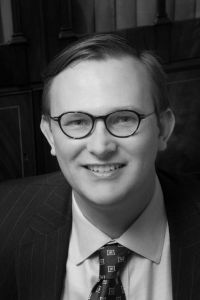This interview originally appeared in Southern Literary Review.
AM: Thanks for taking the time to talk to Southern Literary Review about The Word, your second novel. Jace Forman, the protagonist of your first novel, Cried For No One, is back in this novel. How has your experience as a trial lawyer shaped Jace’s character, if at all? Is it even possible to identify where your legal background has shaped your character development?
HC: I leaned heavily on my experiences as a trial lawyer while creating Jace Forman. I actually know how it feels to try “high-stakes” lawsuits – the intense pressure, the sleepless nights, the perpetual gnawing in your stomach – because I have lived through them. What a trial lawyer goes through in his professional life has a profound impact on his personal life – again, I felt I was able to portray that realistically with Jace because personal experience was a good teacher. I am not saying Jace is autobiographical – he’s not. That being said, my ability to create his character was, in large part, the result of having been a trial lawyer myself.
AM: I’m not out-of-bounds in supposing that readers of Cried For No One will, like me, associate Ezekiel Shaw and the Brimstone Bible Church with Fred Phelps and the Westboro Baptist Church, which is featured in the book. Is there a deliberate connection?
HC: I taught Free Speech and the First Amendment to SMU undergraduates. One of the cases we discussed in class was Snyder v. Phelps. There were some lively exchanges between students over whether the Supreme Court got it right when they threw out the multi-million dollar judgment awarded to the Snyders. Had the Court gone too far in protecting free speech? Had the Court allowed a zealous sect to trample upon the rights of a family to bury their loved one in peace? Our classroom debate inspired me to change the factual scenario, inject a different religious issue and pit the conflicting positions against one another in a fictitious lawsuit.
AM: What made you decide to incorporate Leah Rosen and Cal Connors into the plot? Did you envision them at the outset, or did they come later, after you had already begun writing?
HC: Cal and Leah were characters from my first novel, Cried for No One. Leah continues her investigation into Cal’s legal misdeeds in the stand-alone sequel.
AM: As someone who has never attempted to write a thriller, I’m curious about how the intricate thriller plot falls into place. How much mapping or outlining do you do before beginning the writing process, and how often is the writing process interrupted by the need to adjust or revise?
HC: Before I wrote a word of the manuscript, I drafted a detailed, chapter-by-chapter outline, which went through a number of revisions. Once the outline was finished, I began writing the novel. Some might argue that having an outline is too confining. I get that. But for me, it is important to know where I’m ultimately going to end up before I start the journey. I find there is plenty of opportunity for creativity along the way.
AM: Texas. It’s big on the map and big in your book. You’ve been practicing law there for some time. How far back does your connection go?
HC: A long way. I graduated from Vanderbilt in 1973 and then attended SMU Law School. After receiving my law degree from SMU, I began practicing trial law in Dallas and that’s what I’ve been doing ever since. Although I grew up in Tennessee, I felt right at home in Texas. As the old adage goes, when you prick a Texan, he bleeds Tennessee blood.
AM: Why did you dedicate this book to your female law school classmates?
HC: One of my close friends and study partners in law school was female. She was brilliant, graduating number one in our class. And yet she received few offers from the top law firms in Dallas. There could be only one explanation – she was a woman. She, along with several other of my female classmates who had encountered a similar fate, took bold action and sued some of the major firms in Dallas. A settlement was reached which opened the door to countless female law school graduates afterwards.
AM: When did you start writing fiction?
HC: Over twenty-five years ago. I wrote a manuscript that has still not been published, although I consider pulling it out of the banker’s box it’s been in for years and giving it a read to see if it’s salvageable. After I shelved it, I was inspired to write my first novel, Cried for No One, by an actual lawsuit I handled involving a macabre grave robbery. I got up early each morning and wrote before going to work. The process took me years before I had a finished manuscript.
AM: Do you know what the future holds for Jace Forman? Can readers expect to see him again?
HC: I have enjoyed creating and getting to know Jace. Based upon the reviews, readers seem to like him and, if that sentiment continues, I will likely keep him around for a while.
AM: Last question, but two parts. How much research into the First Amendment went into this book? And how interested were you in First Amendment issues before you started into this book?
HC: I have studied the First Amendment, and the cases interpreting it, extensively. As mentioned above, I actually taught a course about it to SMU undergraduates. The drafters were so brilliant and far-sighted to come up with such an important enactment. We will forever be in their debt.
AM: Thank you again.


